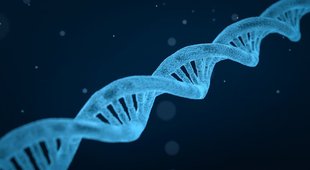Rare genetic mutations of ovarian cancer

Research currently suggests that RAD51C, RAD51D, and BRIP1 are most significantly linked to ovarian cancer.
Although there is information available for those with a BRCA gene mutation or Lynch syndrome, there is far less information available about rarer genetic mutations that can also increase your risk of developing ovarian cancer. Here we look at some of the lesser-known gene mutations linked to the disease.
Are there other genes than BRCA1/2 and Lynch syndrome that are linked to ovarian cancer?
Yes, there are a handful of other genes which have been connected to ovarian cancer. Some of these genes are at moderate risk, and none are thought to increase ovarian cancer risk as much as BRCA1. Pathogenic variants (also known as mutations) in these genes are found less often than those in BRCA1 and BRCA2. These genes are:
- RAD51C
- RAD51D
- BRIP1
- PALB2
There are also some other genes that are linked to specific types of ovarian cancer seen in very rare cancer syndromes. These genes are:
- STK11 (Peutz-Jeghers syndrome) which is linked to sex cord (SCTAT) tumours
- DICER1 which is linked to Sertoli-Leydig cell tumours
Do they increase the risks of other cancers too?
The research currently available suggests that RAD51C, RAD51D, and BRIP1 are most significantly linked to ovarian cancer. More research is needed to confirm if there are other significant cancer risks. For example, some studies suggest they may also be linked to breast cancer, although more data on this is needed.
Pathogenic variants in PALB2 do cause an increased lifetime risk of breast cancer. This is thought to be similar to the risk seen in BRCA2. There is also some evidence to suggest that PALB2 may cause a small increased risk of pancreatic cancer. However, as we have only begun testing for PALB2 more recently we still need further research to consider its other cancer risks.
The genes involved in the very rare cancer syndromes do increase the risk of other cancers. STK11 causes bowel polyps and so increases the risk of bowel cancer, as well as some other rare cancers. DICER1 is linked to a range of thyroid tumours in young people, and the rare childhood lung cancer, pleuropulmonary blastoma.
How do you know if you should be tested for these?
If you have been diagnosed with ovarian cancer, and have another close relative (sibling, mother, aunt) who has also been diagnosed with ovarian cancer you may be eligible for a gene panel test. This is a test where multiple genes linked to a specific condition are tested. You can talk to your treatment team about this, and they may refer you to your local clinical genetics service for testing.
Similarly, if you have two deceased close relatives, on the same side of the family, who have had ovarian cancer you should speak to your GP about getting a genetic assessment. However, in those with a history of ovarian cancer, it’s important to remember that in genetics we would always start testing in a living affected relative if available.
Are there other genes we still can’t identify and test for?
Cancer genetics is an ever-evolving field which makes answering questions like this a little complicated. In short, yes, there are likely to be genes that current tests can’t identify that will be linked to ovarian cancer with further research.
There are also variants in genes we already know about that we don’t yet understand. We call these variants of uncertain significance (VUS). The more we learn about these variants, there is a chance we may find that they cause an increased risk of ovarian cancer.
Those who have had a ‘negative’ genetic panel test result can get back in touch with their local genetics service in a few years to see if this result has changed, or if there are any new genes we have learned about.


